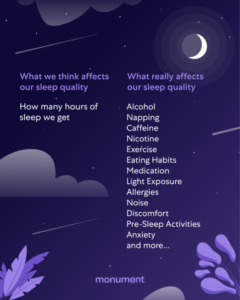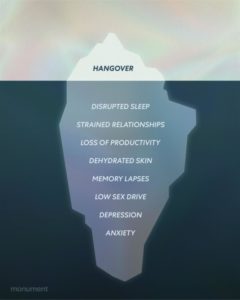If you’ve had trouble sleeping, you’re not alone. In fact, up to 40% of Americans experience insomnia at some point in their life. And if you drink alcohol, it can complicate sleep issues even further. While drinking alcohol can help you fall asleep faster, it ultimately deprives you of high-quality, restful sleep. Practicing healthy sleep habits and changing your relationship with alcohol can reset your natural sleep cycle, and transform your life.
How Does Alcohol Affect Sleep Cycles?
There are two primary ways in which alcohol consumption can negatively affect your sleep cycle:
- Alcohol use can reduce how much rapid eye movement (REM) sleep you get each night
- Alcohol use can cause frequent sleep disruptions
Let’s dive a bit deeper into each.
Lack of REM Sleep
There are two types of sleep, non-REM sleep and REM sleep. REM sleep is a kind of sleep that happens at intervals throughout the night and is characterized by dreaming, rapid eye movement, and faster breathing and heart rate. Alcohol can induce non-REM sleep quickly, but this throws off the natural sleep cycle, reducing your overall amount of REM sleep. Why is REM sleep so important? During REM sleep your body is able to relax and rest more fully. While your body is resting during REM sleep, your brain actually becomes more active and stimulates its long-term memory center. Not only can losing REM sleep make you feel sleepy and drained when you wake up, but it can also lead to long-term memory loss, impaired judgment, and overall decreased cognitive functioning.
Sleep Disruptions
If you drink before bed, your body is metabolizing and processing alcohol while you’re trying to sleep. This can cause increased sleep disruptions for two reasons. The first being that alcohol is a diuretic, meaning it makes you need to urinate more frequently. Secondly, your nervous system can become hyperactive as the depressive effects of alcohol wear off, which can wake you from your sleep. This is also the reason why you might feel anxious when you wake up (a phenomenon often referred to as hangxiety.)
Can One Alcoholic Drink Affect My Sleep?
While it’s unlikely one alcoholic drink will have a significant impact on your sleep quality, this varies by individual and context. The closer alcohol is consumed to bed time, the more likely your sleep cycle will be affected. Sleep disruptions are also more likely if you drink on an empty stomach, or don’t hydrate while drinking. By taking a look at your own drinking habits and sleep quality, you’ll be able to better determine the role alcohol plays in your personal sleep cycle.
Does Alcohol Help You Fall Asleep?
Many people use alcohol as a short-term solution for sleep difficulties. This is because alcohol is a depressant, which means it suppresses your nervous system, causing increased drowsiness and slowed brain activity. In the long-term, however, using alcohol to fall asleep stops being effective, and can even worsen sleep issues. Studies show that while 2-3 drinks can help induce sleep, these effects start to diminish after 3 days of repeated alcohol use before bed.¹ Chronic alcohol use can also exacerbate symptoms of insomnia, and worsen overall sleep quality.

Effects of Chronic Drinking on Sleep
Alcohol use disorder (AUD) is a medical condition characterized by drinking more than you want to and for longer than you want to despite wanting to cut back. Someone with AUD is likely to experience challenges when it comes to getting restful sleep. These challenges may include not being able to fall asleep without alcohol and experiencing alcohol withdrawal symptoms in the night. People with alcohol use disorder are also at a higher risk for:
- Sleep apnea
- Nightmare disorders
- Periodic limb movement disorder
- Insomnia
Alcohol use disorder is a treatable condition. Cutting back or cutting out alcohol can significantly improve sleep quality, among many other benefits. And you don’t have to do it alone. You can discuss your alcohol use and sleep habits with a physician to get a personalized plan to help you change your relationship with alcohol and get better sleep.
Alcohol and Chronic Sleep Problems
Alcohol is known to exacerbate various sleep problems over time, including sleep apnea and insomnia. If you struggle with a sleep disorder, there’s no shame in having used alcohol for relief. You deserve healthier and more effective tools and treatment.
Alcohol and Sleep Apnea
Sleep apnea is a sleep disorder where breathing starts and stops throughout the night, often resulting in snoring and reduced quality of sleep. Alcohol can relax your upper airway muscles, exacerbating sleep apnea symptoms. Research shows that excessive alcohol use can increase the risk of sleep apnea by 25%.² Alcohol can also trigger sleep apnea for someone who previously didn’t experience it.
Alcohol and Insomnia
Unhealthy alcohol use and insomnia are very commonly co-occuring conditions. Research shows that between 35 and 70% of people who drink alcohol also have insomnia.³ Because of the way alcohol disrupts our sleep cycle and induces anxiety, drinking before bed is shown to exacerbate insomnia, and even induce insomnia for some people.
Does Quitting Drinking Cause Sleep Problems?
While changing your relationship with alcohol improves sleep in the long-term, it can temporarily cause sleep disturbances. After an extended period of unhealthy alcohol use, the body can adapt to the presence of alcohol and even come to rely on it. This is often known as ‘alcohol dependence.’ As alcohol is removed from the equation in early sobriety, its common to experience various withdrawal symptoms as the body adjusts and heals. Insomnia, sleep interruptions, and feeling anxious when you stop drinking are all common symptoms of alcohol withdrawal.
Sleep challenges can last for several weeks or months into the alcohol recovery timeline. It’s important to remember that this discomfort is temporary, and that once this stage is over, your sleep quality will improve. With time, the body will heal and regain its natural ability to get restful sleep.
It’s important to be aware that quitting alcohol cold turkey can be dangerous. It’s vital to speak with a medical provider before you stop drinking to ensure your safety.
If you believe you might be experiencing acute alcohol withdrawal, please contact your healthcare provider immediately and visit https://findtreatment.gov/ to find a location to get supervised detox near you. If this is a medical emergency, call 911.

How to Minimize Alcohol-Induced Sleep Disruptions
The best thing you can do to promote high quality sleep is to maintain your natural sleep cycle. Alcohol disrupts your natural sleep rhythms and sacrifices precious REM sleep. There are several tools that you can use to help you stop drinking alcohol every night and improve the quality of your sleep.
Make a Plan
We’re often taught that sleep is something that happens automatically; we exhaust ourselves throughout the day, and then pass out. In reality, sleep needs to be deliberate and planned for. One of the best things you can do when working to change your sleep and drinking habits is to create an alcohol-free nighttime routine. This can include relaxing activities like taking a hot bath or drinking soothing tea. Another important part of a nighttime routine is maintaining a consistent sleep schedule. While 8 hours is typically a healthy amount of sleep, every individual is different. Whatever ritual and bedtime works for you, the most important thing is to make a plan, and to keep it consistent.
Reach Out to Other People
Hearing from others who have had similar experiences can be an encouraging experience, especially when navigating sleep issues in early sobriety. It’s gratifying to hear from others who have been through the withdrawal process, and to see that it truly gets better with time. Plus, peer support can help you learn first-hand about the tools and resources that have worked for others. At Monument, we offer over 50 therapist-moderated alcohol support groups where you can get support anonymously and entirely online.
Set Realistic Expectations
Unfortunately, there isn’t a quick fix for sleep issues. While there are natural remedies and sleep medications that work for some people, these shortcuts often also sacrifice the quality of your sleep. The best thing you can do is to try to reset your natural sleep cycle, and that takes time. Simply knowing that time is the most effective element to help reset your circadian rhythm can help you remember to stay patient and give your body a chance to heal from the effects of alcohol.

Practice Good “Sleep Hygiene”
Wherever you are in your recovery journey, there are various habits that can help you improve your sleep quality. This set of practices is often referred to as “sleep hygiene.” Here are three sleep hygiene tips to help you get started:
- Make your bedroom a sacred space: Our brain is good at making associations. If you start to feel anxious laying awake at night, get up and go somewhere else in the house. Wait until you’re sleepy, and then get back in bed. Otherwise, your brain will start to associate your bed with anxiousness. This is why it’s not recommended to work in your bed, either. If your brain associates bed with work, it can be hard to ‘turn off’ when it’s time to go to sleep.
- Avoid bright lights before bed: Our circadian rhythm is our body’s natural way of regulating the sleep-wake cycle over roughly 24 hours. This ‘internal clock’ is set by light. When it starts getting dark, our brain starts to release melatonin (the sleep hormone). When we watch television, stare at our phone, or sit under bright lights, our brain starts to think that the sun is up and it’s time for activity. Maintaining a dimly lit environment can set you up for a more successful sleep. And some light is okay! Reading a book is a great alternative to screen-based nighttime activities.
- Practice mindfulness and meditation: Oftentimes our thoughts begin to race when we’re trying to fall asleep, reflecting on the day, and thinking about our to-dos for tomorrow. Practicing mindfulness is a great way to shut out the rest of the world and start to calm down our minds. You can practice mindfulness through meditation, deep breathing, or journaling. Keeping a notepad next to your bed is a great tool for releasing thoughts.
Explore Treatment Options
Many people find that they need extra support in order to change their drinking and sleep habits. There’s no shame in that. In fact, experts recommend using as many tools as possible in order to achieve your sobriety or moderation goals. You can talk to a physician about FDA-approved medication to stop drinking, which can help curb alcohol cravings. There’s also alcohol therapy, where you can work with a therapist to define and reach your goals. That can include developing healthy coping mechanisms and building an alcohol-free nighttime routine that works for you.

Taking a closer look at your alcohol use and how it’s affecting your sleep is an incredible step. Cutting back or cutting out alcohol can radically change your sleep quality. Being well-rested can introduce countless additional gifts to your professional and personal life. It’s never too late (or early) to start making a change. The clinicians at Monument are here to help you find a healthy relationship with alcohol, and discover the power of alcohol-free, high-quality sleep.
Sources:
- Substance abuse vol. 26,1 (2005). “Disturbed sleep and its relationship to alcohol use, https://www.ncbi.nlm.nih.gov/pmc/articles/PMC2775419/.” Accessed Apr, 18. 2022.
- Sleep medicine vol. 42 (2018). “Alcohol and the risk of sleep apnoea: a systematic review and meta-analysis, https://www.ncbi.nlm.nih.gov/pmc/articles/PMC5840512/#:~:text=Results,%25%2C%20p%20%3C%200.0001).” Accessed Apr, 18. 2022.
- Addict Sci Clin Pract 11, 9 (2016). “Sleep abnormalities associated with alcohol, cannabis, cocaine, and opiate use: a comprehensive review, https://doi.org/10.1186/s13722-016-0056-7.” Accessed Apr, 18. 2022.